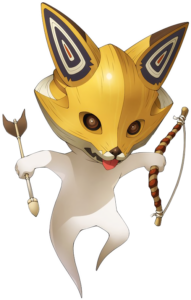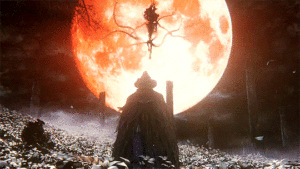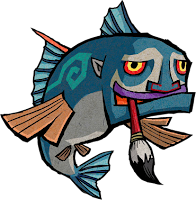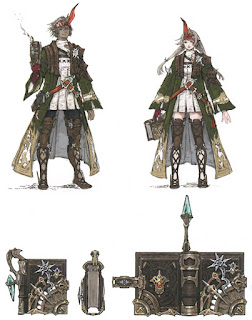Been playing around with Mageblade, and I quite like it. Working on more monsters for that community-building game, and the system has been a good fit.
I made these with their relationship with a community of people in mind–the kingfisher spirits might steal fish from the players and their village, but they could also be bribed into helping them sail, for example. The monsters are also the source of potential local taboos–ringing bells in the woods might attract moon beasts, for example, or gutting fish might lead to the local deities noticing and stealing them. I also designed them so that they could be plugged into the magic system, Pokemon-style, but that’s another post.
Major inspirations are Mushishi, Shin Megami Tensei and Bloodborne.
 |
| from shin megami tensei IV apocalypse |
Two house rules to keep in mind:
- If a monster does something they’re good at, roll under their Aptitude. If they do something they’re bad at, roll under half their Aptitude. Use the tags in their stat blocks to help you decide what they’re good and bad at. Unless otherwise stated, monsters are always good at fighting.
- Spirits appear as a mirage-shimmer to people with +1 Wisdom modifier and can be fully observed by people with +2 Wisdom modifier or more.
Wind Spirits
Wind spirits can raise, banish, strengthen, weaken, or redirect wind in line of sight. The maximum strength of the wind they can control depends on their level.
sylphids
spirit | small | graceful | fast | perceptive | weak | foolish
Level 1 (4 hits), Defense 0, Aptitude 10, Damage 1d4
Ability Magnitude Gentle breezes
Young wind gods, cat-sized and blue-green, singing with a voice like a panpipe. They are like the glimpse of a kingfisher out of the corner of your eye, even when you manage to look at it directly. They love gifts of ribbons and fresh fish–they congregate in a great viridian haze when the scent of fish blood is strong in the air.
sylphs
spirit | graceful | fast | perceptive | violent | foolish
Level 3 (12 hits), Defense 1, Aptitude 12, Damage 1d6
Ability Magnitude Stiff breezes and lesser winds.
Minor wind gods, hound sized, a confusion of emerald-blue wings, calling out in a clear contralto. They are like the reflection of a great kingfisher in troubled water, an elfin face peering out of its mouth, sometimes walking like a bird, sometimes walking like a human. They love rare flowers, jewelry of any sort, and the flesh of fish from the deepest sea. They can be seen whirling around leviathans that have risen to the surface, looking for a chance to eat.
greater sylphs
spirit | graceful | fast | perceptive | cunning | beautiful | hungry
Level 5 (20 hits), Defense 2, Aptitude 14, Damage 1d8
Ability Magnitude Powerful gusts and lesser winds
True wind gods, human sized, wings unfolding like petals on a blooming flower, watchful eyes peering from the center. They can take the shape of a beautiful human of indeterminate gender, or else a tempest of cerulean and green wings and flashing beak and claws. They desire the true names of islands, exquisite treasures, and the flesh and blood of sacred fish. They appear singly when artifacts are excavated or when sea-gods make themselves known, looking for a chance to steal or feast.
high sylphs
spirit | large | graceful | fast | perceptive | cunning | beautiful | hungry
Level 7 (28 hits), Defense 3, Aptitude 16, Damage 1d10
Ability Gales and lesser winds.
Elder wind gods, bigger than a draft horse, like a dream of a kingfisher in flight, a corona of wings and feathers that recalls the motion of waves and the arc of sea-spray. In human shape, they are gorgeous giants, but they can also take the form of a flock of brilliant kingfishers or an enormous kingfisher crowned and jeweled.
Ora Marin, the Kingfisher God
spirit | huge | graceful | fast | perceptive | cunning | beautiful | hungry
Level 10 (40 hits), Defense 4, Aptitude 18, Damage 1d12
Ability Whirlwinds and any lesser wind.
The God of Wind-Over-Water. His wings are beyond counting. He moves like a stormcloud of azure feathers or a wave of green iridescence through the sea or a golden-crowned kingfisher with wings to block the Sun. As a human, he is a crowned dancer, raising fair winds with his fan of blue feathers and sea-oat, whipping up foul winds with his fan of green feathers and palmetto frond.
Moon Spirits
Moon spirits can shed soft white light or summon a pall of darkness. The intensity of the brightness or darkness depends on their level.
elvers
spirit | tiny | slow | wise | hungry | gullible
Level 1 (4 hits), Defense 0, Aptitude 10, Damage 1d4
Ability Range As far as light shed by a candle
Larval moon gods, small enough to fit in your cupped hands. They are something like a white-furred moth and something like a flower blossom, always reduced to a milky silhouette as if occluded by mist. They are delighted by the ringing of bells, the scent of burning incense, and warm spilt blood.
elving-children
spirit | small | graceful | wise | hungry | gullible
Level 3 (12 hits), Defense 1, Aptitude 12, Damage 1d6
Ability Range As far as light shed by a torch
Moon god nymphs, the size of a small dog. They are gracile, fronded, petaled, and winged, with wet human eyes concealed in their folds like pearls in a mound of silk, everything blurred as if by a haze of water. They adore the pealing of bells, the scent of burning sacrifice, and spilt lifeblood, which they lick with deep red tongues.
elves
spirit | small | graceful | wise | hungry | cunning | gullible
Level 5 (20 hits), Defense 2, Aptitude 14, Damage 1d8
Ability Range As far as light shed by a campfire
Imago moon gods, the size of a child. They are thin, pale, sharp-toothed, four-armed, moving as easily on all limbs as their hind legs, and human-like when standing, with a ruff of white hyphae on their heads and necks, a cape of flower petal wings that unfold from their backs, revealing wet raw flesh like the meat beneath a fish’s gill. They are attracted to the tolling of great bells, the burning of the living, and those near death, who they kill and drain of blood if they are able.
 |
| from bloodborne |
elving-beasts
spirit | large | graceful | wise | hungry | cunning
Level 7 (28 hits), Defense 3, Aptitude 16, Damage 1d10
Ability Range As far as light shed by a bonfire
Elder moon gods, the size of a stag. They are pale creatures of gossamer and bone, their many thin limbs concealed behind luxurious effusions of white hyphae, their fronded flower wings trailing like a veil, concealing the gills-slits on their back. They swim as swiftly as they fly and run, but wherever they are, the sounding of old ritual bells, the sudden deaths of many, and living sacrifices prepared in accordance with the ancient agreements draw their attention without fail.
Moon Orphan, the Abandoned God
spirit | huge | graceful | wise
Level 10 (40 hits), Defense 4, Aptitude 18, Damage 1d12
Ability Range A light like the full moon or a darkness like the new, as far as the eye can see
The terrible God of Moonlight, luminous, fronded, billowing. It drives its immense and delicate body through the deepest waters or celestial heights with uncountable limbs, shedding gently glowing clouds through its blue-lipped sporangia, singing lunar hymns through uncountable mouths in communion with the Moon, guiding it through its course in the sky and the cycle of its phases.










